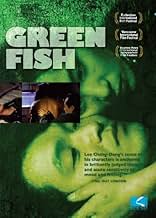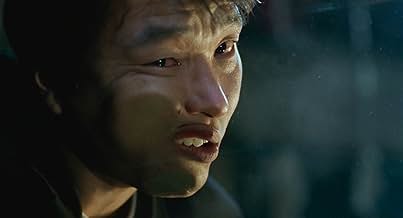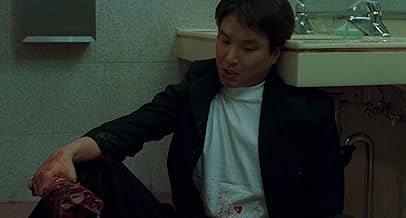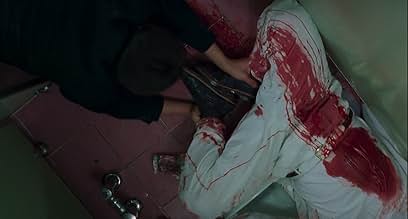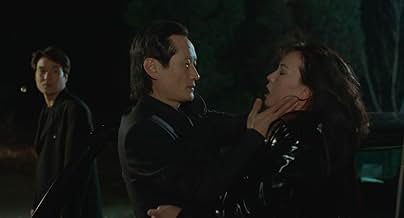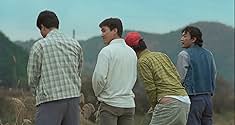AVALIAÇÃO DA IMDb
7,0/10
2,4 mil
SUA AVALIAÇÃO
Adicionar um enredo no seu idiomaReturning home and finding his town drastically changed, a former soldier falls in with gangsters.Returning home and finding his town drastically changed, a former soldier falls in with gangsters.Returning home and finding his town drastically changed, a former soldier falls in with gangsters.
- Prêmios
- 20 vitórias e 6 indicações no total
Kim Dong-gon
- Sandwich Man
- (as Dong-gon Kim)
Lee Ho Sung
- Elder brother
- (as Ho-Sung Lee)
Park Hye-Sook
- 3rd Brother's wife
- (as Hye-sook Park)
Son Yeong-soon
- Mother
- (as Young-Soon Son)
Avaliações em destaque
Lee Chang-Dong recently got a lot of attention when his latest movie OASIS one multiple Korean awards. OASIS is a unique movie that examines of the lives and loves of characters who normally do not get much attention from cinema or the public. It's an unusual sort of love story, and was a bad choice to watch with my girlfriend on Valentine's Day. Chang-Dong's directorial debut GREEN FISH is a far less ambitious film, but still shows the work of a talented and mature director.
Makdong (Han Suk-Kyu) is a naive young man who returns home after his spell in the army full of hopes and (small) ambitions. Now that he's a man, he wants to make a lot of money and be able to look after his family. Unfortunately, when he gets home he is treated to a little dose of reality. The area is economically depressed, and his family are not the close loving unit he wishes them to be.
Making lots of money proves to be a lot more difficult than he anticipated, as jobs in the area are pretty scarce. One area that does offer employment is crime, as the area is controlled by the gangs. A chance encounter with a young woman leads him to meet a gang boss who seems to be a little more respectable than most, and when he's told he won't have to break the law he accepts a job.
The boss takes a liking to Makdong's simplicity and straightforward character and looks after him well, to the resentment of other members of the gang. Despite the promise of legitimacy, he learns that gangs cannot really live by the law, and he gets drawn further into the criminal life.
GREEN FISH is a distinctly Korean film, which is not to say that all Korean films are the same (clearly not the case), but there are a few styles of film that do seem especially Korean, and this is one of them. It is a slowly paced and subtle film, allowing the story and characters to reveal themselves indirectly through the strength of the acting. The cast are all strong actors, and this allows the style of film to work. The story of an innocent young man drawn into the gangster world is not really a new one, and GREEN FISH does not try to add much that is new to it. It just focusses on the characters, their hopes and conflicts and their disappointments. The tone is not one of hope or happiness, with economic worries making reality hard. None of the characters in the movie are angels and none are devils - instead they are much more realistic human beings, full of good intentions and weaknesses.
GREEN FISH is perhaps a little too subtle, or perhaps the actors are not quite good enough for the director's ambitions. Either way, the characters remain a little vague to us, and our involvement with their stories is hence slightly diminished. It is still a movie of strong characters, however, and a well told story until the slightly weak ending.
Korea produces some very strong dramas, with a high level of "art" being found in much of the nation's cinematic output. GREEN FISH is an accomplished debut that fits well with recent Korean cinema, though it is a little too conservative to be classed in the higher ranks. Good for a first film though, and Lee Chang-Dong is definitely a director to keep an eye out for.
Makdong (Han Suk-Kyu) is a naive young man who returns home after his spell in the army full of hopes and (small) ambitions. Now that he's a man, he wants to make a lot of money and be able to look after his family. Unfortunately, when he gets home he is treated to a little dose of reality. The area is economically depressed, and his family are not the close loving unit he wishes them to be.
Making lots of money proves to be a lot more difficult than he anticipated, as jobs in the area are pretty scarce. One area that does offer employment is crime, as the area is controlled by the gangs. A chance encounter with a young woman leads him to meet a gang boss who seems to be a little more respectable than most, and when he's told he won't have to break the law he accepts a job.
The boss takes a liking to Makdong's simplicity and straightforward character and looks after him well, to the resentment of other members of the gang. Despite the promise of legitimacy, he learns that gangs cannot really live by the law, and he gets drawn further into the criminal life.
GREEN FISH is a distinctly Korean film, which is not to say that all Korean films are the same (clearly not the case), but there are a few styles of film that do seem especially Korean, and this is one of them. It is a slowly paced and subtle film, allowing the story and characters to reveal themselves indirectly through the strength of the acting. The cast are all strong actors, and this allows the style of film to work. The story of an innocent young man drawn into the gangster world is not really a new one, and GREEN FISH does not try to add much that is new to it. It just focusses on the characters, their hopes and conflicts and their disappointments. The tone is not one of hope or happiness, with economic worries making reality hard. None of the characters in the movie are angels and none are devils - instead they are much more realistic human beings, full of good intentions and weaknesses.
GREEN FISH is perhaps a little too subtle, or perhaps the actors are not quite good enough for the director's ambitions. Either way, the characters remain a little vague to us, and our involvement with their stories is hence slightly diminished. It is still a movie of strong characters, however, and a well told story until the slightly weak ending.
Korea produces some very strong dramas, with a high level of "art" being found in much of the nation's cinematic output. GREEN FISH is an accomplished debut that fits well with recent Korean cinema, though it is a little too conservative to be classed in the higher ranks. Good for a first film though, and Lee Chang-Dong is definitely a director to keep an eye out for.
I see this as a film about how hard it is to do the right thing in the complex modern world. Makdong's family used to own acres of farmland that are now covered in ugly apartment buildings and now they get by selling eggs to the residents. All Makdong wants to do is make this easier for his family and in the process he becomes a gangster just to get by. Even the gangsters are between doing the right thing and doing what they must to survive. Makdong's "Big Brother" likes to think of himself as different from the other thieves and killers that make up the underworld but in the end he is no better.
Green Fish is not a real gangster movie, but more an illustration of the battle between good and evil, between innocence and depravity, between the righteous one and those who only believe in the law of the strongest, between the city (and all its poisons) and the countryside (with its green fish). The law of the strongest is not only a matter of physical forces (strength, number), but also of mental ones (deception, manipulation, ambush, cynicism of the individual). The film has also a socio-economic dimension: the protagonist of the movie is a young man who has been released from the army. He has no job, but is hired by the immoral leader of a gang who appreciates his courage, his sincerity and his 'morality' (his sense of justice). And the women in all that? They have no other choice but to follow the strongest, if, and only if, they are young and beautiful. As for the unborn child, there is more than serious doubt about the real father
The first film by Lee Chang-dong contains already many ingredients of his later movies: a train, spasticity, gratuitous violence or exploitation of innocence. It says a lot about the director's vision on the way of the world.
The first film by Lee Chang-dong contains already many ingredients of his later movies: a train, spasticity, gratuitous violence or exploitation of innocence. It says a lot about the director's vision on the way of the world.
For a debut movie, then Chang-Dong Lee really hit it right on the head with "Green Fish". This movie was really beautiful and captivating.
The story is interesting and picks you up right from the very beginning and takes you on a very emotional ride through hope, love, frustration, anger, remorse and pity. The story is about Mak Dong who has been released from the army, returning back to his home village, finding it a completely new place, no longer a village, but now a bustling town. Struggling to find his place in a different environment, Mak Dong happens to fall upon a chance to work for Bae Tse-Yong, who isn't particularly running business according to the law.
Chang-Dong Lee is really a great storyteller, and he is great at portraying people that aren't exactly "normal". His characters in his movies are very vibrant and full of personality and life, despite them having been dealt a bad hand from life. And if you enjoyed "Green Fish", then you definitely need to watch "Oasis" as well.
It never ceases to amaze me the amount of amazingly beautiful movies that come out of Asia. "Green Fish" will stay with you for a long time after you have seen it. And it had the most memorable death scene in a movie that I have seen since Willem Dafoe's death scene in "Platoon".
"Green Fish" is really a brutally honest movie that plays high on emotion and empathy. I enjoyed this movie quite a lot and highly recommend you to watch it if you like Asian cinema.
The story is interesting and picks you up right from the very beginning and takes you on a very emotional ride through hope, love, frustration, anger, remorse and pity. The story is about Mak Dong who has been released from the army, returning back to his home village, finding it a completely new place, no longer a village, but now a bustling town. Struggling to find his place in a different environment, Mak Dong happens to fall upon a chance to work for Bae Tse-Yong, who isn't particularly running business according to the law.
Chang-Dong Lee is really a great storyteller, and he is great at portraying people that aren't exactly "normal". His characters in his movies are very vibrant and full of personality and life, despite them having been dealt a bad hand from life. And if you enjoyed "Green Fish", then you definitely need to watch "Oasis" as well.
It never ceases to amaze me the amount of amazingly beautiful movies that come out of Asia. "Green Fish" will stay with you for a long time after you have seen it. And it had the most memorable death scene in a movie that I have seen since Willem Dafoe's death scene in "Platoon".
"Green Fish" is really a brutally honest movie that plays high on emotion and empathy. I enjoyed this movie quite a lot and highly recommend you to watch it if you like Asian cinema.
If you're looking for a good story that'll leave you awe-stricken or at least satisfied, then you've chosen the wrong film. How a man in his mid twenties can be naive on the par with a 14 or 15 year old just isn't plausible in the real world, especially in the late 90s, unless he is retarded. And the lead character is not retarded. Another idiocy of the film is that the lead who is, and looks obviously to be, in his mid 30s is playing a naive, almost moronic 24 year old. The film is hogwash, and I was annoyed after wasting almost 2 hours watching it.
Você sabia?
- ConexõesFeatured in Son-nim-eun-wang-e-da (2006)
Principais escolhas
Faça login para avaliar e ver a lista de recomendações personalizadas
- How long is Green Fish?Fornecido pela Alexa
Detalhes
- Tempo de duração1 hora 51 minutos
- Cor
- Mixagem de som
- Proporção
- 1.85 : 1
Contribua para esta página
Sugerir uma alteração ou adicionar conteúdo ausente


